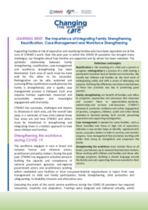
Background Information
Macrine holds a Bachelors of Arts degree in Sociology from Egerton University. She is also certified on Child Development and Psychosocial support by National Children Advocacy Centre; Conflict Management and Resolution by Centre for Conflict Management and Resolution Kenya.
She is a skilled trainer in Value Based Life Skills, Skilful Parenting, Child Protection, Gender Based Violence and Case Management for Reintegration.
Our Interview With Practitioner
Taking up different roles has enabled me to develop skills as a practioner. I started my role as an intern supporting program activities and overtime through practice and capacity building have grown to Coordinating Projects. I have worked with ChildFund Kenya and ICS Africa at different capacities that ensures child protection and well being and families providing safe and nurturing family environments. I have also implemented projects for reduction of HIV infection among adolescents girls and boys between ages (10-19)
Families are fundamental for a child's growth and safety for them to realize their full potential. Every child has a potential or ability to become whom they want. We just need to provide an enabling environment. Every family has potential to take care of their children, we just need to help them identify their strengths and build on them.
I used to think institutions were better places for children and through the work we do on care reform, I have really come to appreciate the importance of family care for children, especially those between ages 0-3 years.
Capacity building activities and accompaniment are two important tools for the different aspects of care reform to support the many different actors.
Development of different standard operating procedures for children's care and their implementation is also important. For example, the Kenya Case Management for Reintegration Package, case management for prevention, Guidelines for Alternative Family Care of Children and different training materials/ manuals are also important resources.
The availability of financial resources to support families and children is critical though.
I have great passion in working with children and families. Growing up in an environment where not all children had an opportunity to access education and were exposed violence and other child protection concerns that were not addressed motivated to be one of those people who creates awareness on this issues. I my work I want to provide solutions to some of these problems, as well as ensuring the general safety of children in families.
The best approach for supporting families is first recognizing that we are working with the families, not for them. We have to use the strength based approach (realizing that every family has potential and internal resources that we need to build on) and as we support families they need to be the key decision makers in the process.
Where They Operate
Key Areas of Work
Languages Spoken
Practitioner Resources
This brief summarizes the original design of Changing the Way We Care’s family strengthening approach, the lessons learned during implementation, and the adaptations that CTWWC is making to maximize the impact of its family strengthening work.
This learning brief was developed as part of the CTWWC 2021 annual report and shares learning from several contexts and is intended to share learning on how family strengthening, reunification, case management and workforce strengthening can be integrated in care reform.


